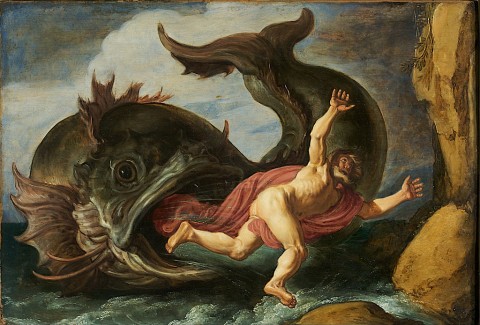It’s been two days since we were swallowed by the loneliest whale in the world. Two days since we caught in its trachea, and having nowhere else to go, crawled into its damp cave of a belly.
We are brothers. Our first night in the whale, we took turns sleeping, resting our heads against the other’s knees—something we hadn’t done since boyhood afternoons on our father’s shipping vessel. We used our headlamps to shine halos against the whale’s rib cage. We cast shadow puppets against the vertebrae. We located and then avoided the large intestines.
The whale’s song vibrates through our bones, tickles our ear canals. When one of us speaks, we have to say, Speak up. I can’t hear you. Speak up. We try to read each other’s lips and find we can’t.
…
You might say we’d been asking for it. We heard about this whale on the news—a whale with a fifty-two hertz song, too high-pitched to be understood by its brothers and sisters—and were seized by a desire to see it. We took to the sea in the masted ship we’d inherited from our father. For seventy-two days, we tracked the whale from Anchorage to Panama. But in the end, the whale found us. Off the coast of Central America, it was as though a hole had opened in the sea. The indigo waters spilled over themselves, seagulls screamed. Our ship tilted, and we slid between the beaked lips. We clung to what we thought were our last minutes of life. We have no children or wives, so we tried to picture the face of our mother and the face of our beloved beagle, Blaze. We tried to picture the faces of the last women we kissed, but the images we conjured were only composites, hybrids of every woman we’d ever loved or lusted over or tacked above our bunk in glossy brilliance.
We waited for our worlds to go dark.
…
Before long, we’re eating krill. They’re clear-bellied, feather-limbed. They feel like onion skins in our mouths, and we have to eat handfuls to feel like we’ve eaten anything at all.
We wish our whale would swallow something more substantial. Ruby-fleshed tuna or tiny octopi with suckers like jelly rings. After a meal of krill, the thought of manta ray makes us salivate.
We’ve just gotten used to the whale’s eerie song, the persistent tremor in our chests, when it goes quiet. Except for the gentlest rise and fall of its stomach, the whale is still. We hear the slow beat of its heart, the crack of stored oxygen in its lungs.
Asleep, we agree, and we crawl on our hands and knees to the space where the belly becomes throat. Soft flesh narrowing to a ribbed tunnel. Here, the whale’s heartbeat consumes us. We count eight beats in sixty seconds. We wonder if the whale knows if we’re here, if she sensed the moment she became a container. In sleep, can she dream herself inside her own rib cage? Can she dream herself across the ocean, to the source of conversations she can never join?
…
In the belly of the whale, we invent similes to pass the time.
Sitting in a whale is like sitting in a tuba’s spit valve.
Sitting in a whale is like sitting in a bowl of leftover ABC soup.
We cast shadow puppets on her rib cage, and we give our shadow puppets stories. The swan swallows the fox swallows the dog swallows the spider. Our shadow puppets’ mouths move but make no sounds. They lost their voices after so much chewing.
We trade quotes from the old black and white submarine movies our father would watch after dinner when we were children. On land, submarine men were tall and sharp-suited, but in the depths of the ocean, they wore frayed, high-necked sweaters. They wore boots with puddles in the heels. In the tight, underwater corridors, they brushed shoulders, and they held each other without shame.
We figure a whale is a kind of submarine. We sit back to back. We imagine what it means to be a whale, not contained but afloat. Miles of ocean below, unknowable sky above.
Enclosed in the whale’s loneliness, we feel like brothers again. We called each other brother, but it’s the first time in years that it’s been true. The whale tilts in her sleep. We tie our shoelaces together so if one of us falls into the intestines, we both will.
…
The whale sings again. As she sings, her body shivers. She seems to be shaking herself awake. Her voice moves through us like we’re nothing, and it feels impossible that her kin will never understand this song.
We don’t know when we’ll be able to speak again, so we raise our voices with the whale. We yell without words. We were never singers. We used our voices only for shouting commands to our crewmates, for ordering second and third and fourth pints, for saying I love you to our mother and then to women we wanted wooed. But now we match our pitch to her hertz, we find her song in our guts.



 The core workshop of SmokeLong Fitness is all in writing, so you can take part from anywhere at anytime. We are excited about creating a supportive, consistent and structured environment for flash writers to work on their craft in a community. We are thrilled and proud to say that our workshop participants have won, placed, or been listed in every major flash competition. Community works.
The core workshop of SmokeLong Fitness is all in writing, so you can take part from anywhere at anytime. We are excited about creating a supportive, consistent and structured environment for flash writers to work on their craft in a community. We are thrilled and proud to say that our workshop participants have won, placed, or been listed in every major flash competition. Community works.